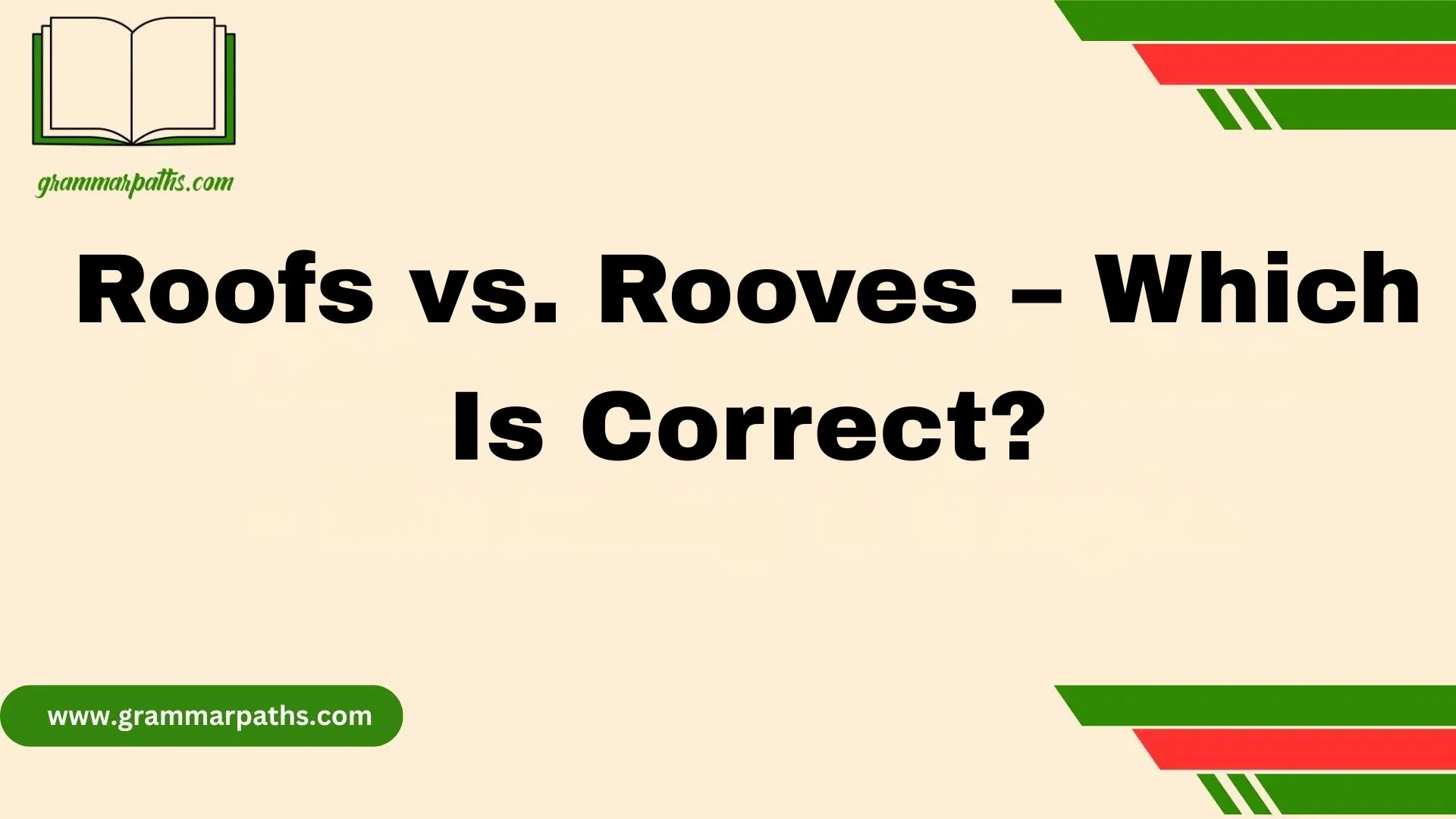When it comes to the plural form of roof, many people get confused because English pluralization can be quite complicated. Unlike some nouns that follow simple rules when transitioning from single to plural, roof does not follow the same pattern as words like hoof and spoof. For example, the plural of hoof is hooves, and the plural of spoof is spoofs by just adding a plural suffix. You might wonder if the plural should be rooves like hooves, or roofs like spoofs and poofs.
From my experience reading and writing English, the correct and standard form used today is roofs. Even though historical precedent shows that rooves was once in use, it has mostly fallen out of favor. The versions with roofs are what most people use now, and it’s less confusing this way. If you’re unsure whether to write roofs or rooves, just remember that the plural of roof follows the same rule as spoofs and poofs—simply add an “s.” I continue to learn more about such quirks of English, and this one is easy to keep in mind. So, next time you’re writing, just continue reading and stick with the clear plural form, roofs.
The Roofs vs. Rooves Confusion
Let’s start simple. Most people say and write “roofs” when talking about more than one roof. For example:
- The houses on our street all have red roofs.
Yet, some older books, dialects, or informal contexts sometimes use “rooves.” This form can sound strange or incorrect to many readers today. So, why does “rooves” exist at all? Is it a valid plural, or just a relic from the past?
Understanding this starts with how English forms plurals — especially for words ending in the letter “f.”
What Is the Plural of Roof?
The standard, widely accepted plural of roof in modern English is roofs. This form appears in every major dictionary, including Merriam-Webster and Oxford English Dictionary, and it’s the one you’ll see in newspapers, academic writing, and everyday speech.
- Roofs is the default plural used in both American and British English today.
- Rooves is considered archaic and is rarely used outside of certain dialects or historical texts.
So, if you want to sound natural and clear, always use “roofs.”
English Pluralization Rules for Words Ending in “F” or “FE”
Here’s where it gets interesting. Many English nouns ending with “f” or “fe” change the ending to “ves” in their plural forms. For example:
- Wolf → Wolves
- Knife → Knives
- Wife → Wives
This might make you think roof should turn into rooves. But that’s not the case here.
Why? Because English doesn’t apply this “ves” rule uniformly. There are plenty of exceptions, especially for words related to structures or things.
Common “f” → “ves” words vs exceptions
| Word (Singular) | Plural Form | Notes |
| Wolf | Wolves | Follows “ves” pluralization |
| Knife | Knives | Common “ves” change |
| Wife | Wives | Standard “ves” plural |
| Leaf | Leaves | Follows “ves” |
| Roof | Roofs | Exception — regular plural |
| Cliff | Cliffs | Does not change to “ves” |
| Proof | Proofs | Regular plural |
| Hoof | Hooves / Hoofs | Both accepted (Hooves preferred) |
As you can see, the English pluralization system mixes tradition, pronunciation, and history. Some words follow the “ves” rule; others stick to a regular “s” ending.
Historical and Regional Use of “Rooves”
The form “rooves” isn’t just a typo or mistake. It actually has roots in historical English, especially during the Middle English period (roughly 1150 to 1500 AD). Back then, English plurals were less standardized, and the “f” to “ves” change was more widely applied.
- Rooves appeared occasionally in older texts, reflecting how English was evolving.
- Some regional dialects in parts of the UK, like certain northern English accents, still use or recognize “rooves” informally.
- However, over time, the plural roofs became dominant, favored for clarity and simplicity.
Example from literature: In some 17th-century writings, you might find “rooves” used, but these instances are rare and mostly replaced in modern English.
Today, rooves is generally considered archaic or dialectal and is not recommended for formal writing.
Why “Roof” Doesn’t Follow the “F to Ves” Rule
Linguists suggest a few reasons why roof keeps a regular plural, unlike wolf or knife.
- Pronunciation Influence: The ending sound of roof is pronounced with a clear “f” sound, making the “ves” plural (which sounds like “v”) less natural.
- Spelling Simplicity: English tends to favor keeping the original spelling when possible, especially for words in everyday use related to buildings or objects.
- Historical Usage: Over centuries, roofs gained traction as the preferred form, solidifying its place in modern grammar.
The contrast with hoof is interesting: both words end in “f” and relate to animals or parts of animals. But “hoof” often changes to “hooves,” likely because it refers to a living, moving part and the sound shift fits better with the “ves” pluralization.
Common English Pluralization Exceptions
English loves exceptions. Besides roof → roofs, there are several other nouns ending in “f” or “fe” that don’t follow the “ves” plural rule.
Some regular plurals ending in “s”
- Cliff → Cliffs
- Chief → Chiefs
- Handkerchief → Handkerchiefs
- Sniff → Sniffs
Irregular plurals ending in “ves”
- Calf → Calves
- Shelf → Shelves
- Half → Halves
This inconsistency makes learning English plurals a challenge. Often, it’s best to check trusted dictionaries or style guides if you’re unsure.
The Role of Language Evolution and Usage
English is a living language — it constantly changes with how people speak and write.
- Popular usage often determines which forms survive and which fade away.
- If most people say “roofs,” then dictionaries, writers, and teachers will accept and promote that form.
- Sometimes, so-called “incorrect” forms become standard over time (like “email” or “okay”).
- Conversely, rare forms like “rooves” lose ground unless preserved by local dialects or literature.
Lexicographers like Merriam-Webster track this usage carefully. The 2023 Merriam-Webster entry for roof confirms “roofs” as the plural — with “rooves” noted only as archaic or dialectal.
Current Consensus: Which One Should You Use?
If you want to write clearly and correctly today, follow these guidelines:
- Always use “roofs” in formal writing, professional communication, and everyday conversation.
- Avoid “rooves” unless quoting older texts or highlighting a dialect.
- When in doubt, check a reputable dictionary (Merriam-Webster, Oxford, Cambridge).
- Remember that sticking with “roofs” will avoid confusion and keep your writing modern and natural.
Quick Facts: Roofs vs. Rooves Summary Table
| Aspect | Roofs | Rooves |
| Usage | Modern, standard | Rare, archaic, dialectal |
| Recognition by dictionaries | Fully recognized | Marked as archaic |
| Formal writing acceptability | Yes | No |
| Regional usage | Universal | Limited to some dialects |
| Pronunciation | /ruːfs/ | /ruːvz/ (rare) |
Additional Resources and References
- Merriam-Webster Dictionary: Roof
- Oxford English Dictionary: Roof
- Cambridge Dictionary: Roof
- Crystal, David. The Stories of English. Penguin Books, 2005.
- McArthur, Tom. English Grammar Today. Cambridge University Press, 2011.
Conclusion
In short, the correct plural form of roof is roofs, not rooves. While rooves has some historical precedent, it’s rarely used today. Following the simple rules of English pluralization, it’s easier and more common to add an “s” to make roof plural, just like with spoofs or poofs. So whenever you write about more than one roof, remember to use roofs to sound clear and correct.
FAQs
Q: Can I use “rooves” instead of “roofs”?
A: You can, but it’s very old-fashioned. Most people and dictionaries prefer roofs today.
Q: Why do some words like “hoof” change to “hooves”?
A: Some words follow old English rules where the ending changes in the plural. But roof doesn’t follow that pattern.
Q: Are “spoofs” and “poofs” plural like “roofs”?
A: Yes, exactly! They just add an “s” to make the plural.
Q: Is “rooves” ever correct?
A: It’s not wrong historically, but it’s not standard or common now.
Q: What is the simplest rule for making plurals in English?
A: Usually, just add “s” to the singular word, unless the word has a special rule.

Mia Rose is the passionate writer and founder of GrammarPaths.com, a resource dedicated to helping learners master English grammar, idioms, and writing skills with ease. With a deep love for language and years of experience in teaching and content creation, Mia simplifies complex grammar rules into clear, practical guides that readers can instantly apply.










